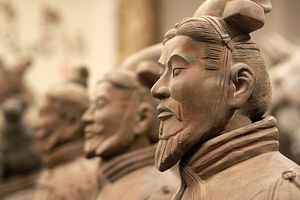In China, there has been a trend recently to use Sun Tzu and The Art of War as a source of soft power for China’s peaceful development strategy. This trend is present in the 2014 9th International Symposium on Sun Tzu’s Art of War hosted by the Chinese Academy of Military Science titled “Sun Tzu’s Art of War and Peace, Coopberation and Development.” According to the conference description, “Sun Tzu’s Art of War show us that seeking safety through development, cooperation and win-win growth is the right way toward world peace.”
From this description, it would be easy to imagine Sun Tzu as a modern day CCP official describing China’s peaceful development policy. Chinese Ambassador to the United Kingdom, Liu Xiaoming, also sought to use The Art of War to explain Chinese strategic thinking and to build trust during a 2012 speech to U.K. Joint Services Command and Staff College, saying “China has the deterrence and wisdom to win without fighting. But if needed, China has the courage and capability to win through fighting. This is the essence of The Art of War and the soul of China’s military strategy today.” Perhaps it is this image Hu Jintao had in mind when he gave President George W. Bush a silk copy of The Art of War in 2006, or when Beijing’s Renmin University gave a copy of the book to Admiral Michael Mullen during his visit in 2011.
The Chinese are not the only people who have sought to portray Sun Tzu in this way. In his book The Power to Lead, Joseph Nye describes Sun Tzu as a smart warrior who understood the importance of the soft power of attraction. Another example comes from former Australian Prime Minister Kevin Rudd, who gave a speech at the 2014 Sun Tzu conference in Qindao. In his speech, Rudd urged China and the U.S. to avoid the Thucydides’ trap of rising power-status quo power conflict and to form a new kind of great power relationship based on common interests, cooperation and building trust over time. To tie this call for trust and cooperation between the U.S. and China with The Art of War, the closing lines of the speech references Sun Tzu’s warning that “The art of war is of vital importance to the state. It is a matter of life and death, a road either to safety or to ruin. Hence it is a subject of inquiry that can on no account be neglected,” and then subsequently suggested that in modern times the word “state” should be swapped with “world.”
While Sun Tzu did believe that war was a risky proposition that could imperil a state, Rudd’s substitution overlooks the fact that Sun Tzu was not an internationalist, but someone who clearly believed in the importance of achieving decisive victory over enemies.
It is easy to make the case that Sun Tzu rejected the use of force if you take lines from The Art of War out of context. The line most commonly used to this effect is “to subdue the enemy without fighting is the acme of skill.” It is true that force plays a much lesser role in Sun Tzu’s strategy than Clausewitz or other comparable writers, but this usage mistakenly puts the stress on “without fighting,” and ignores that the objective is to subdue an enemy. Another issue with this interpretation is that deception is the most frequently discussed theme in The Art of War. With the context added back in, claiming that Sun Tzu’s The Art of War shows a path to cooperation and win-win solutions actually has an ominous overtone. Claiming to be peaceful while preparing for war is a tactic that follows Sun Tzu’s advice that “when capable, feign incapacity; when active, inactivity.” Recent assertive Chinese maritime actions in the South and East China Seas have caused doubt about China’s professed peaceful intent. Atlantic Council senior fellow Robert Manning has admonished Beijing to follow The Art of War’s counsel to “appear weak when you are strong, and strong when you are weak.” As Manning points out, rather than hiding their strength, China’s expansive territorial claims and maritime harassment of other powers has resulted in other countries in the region bandwagoning with the United States to contain China’s rise.
Leon Whyte is a second year master candidate at the Fletcher School of Law and Diplomacy at Tufts University as well as the Senior Editor for the Current Affairs section of the Fletcher Security Review. His research interests include transnational security and U.S. alliances in East Asia.

































